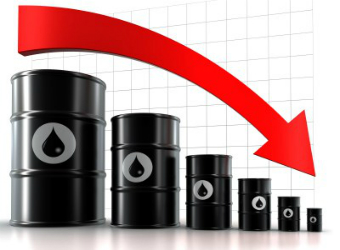Oil prices dropped more than 1 percent Friday, posting a second straight week of losses, on worries that U.S. President Donald Trump’s decision to abandon a climate pact could spark more crude drilling in the United States, worsening a global glut.
U.S. West Texas Intermediate crude futures settled 77 cents, or 1.5 percent, lower at $47.66 per barrel. Benchmark Brent crude futures were trading at $50.10 a barrel by 3:39 p.m. ET (1939 GMT), down 53 cents, or 1.1 percent.
Both contracts were down about 4 percent on the week.
Market analysts are troubled by a growth in U.S. crude production that is straining efforts from the Organization of the Petroleum Exporting Countries to reduce global oversupply.
U.S. drillers this week added 11 rigs, in a record stretch of 20 straight weeks of additions, data from energy services company Baker Hughes showed.
Trump’s withdrawal from the Paris agreement, the landmark 2015 global pact to fight climate change, drew condemnation from Washington’s allies and many in the energy industry – and sparked fears that U.S. oil production could expand more rapidly than it is currently.
Trump seems to be removing any barriers he can find that would obstruct growth of crude oil or natural gas, said Stewart Glickman, energy equity analyst at CFRA in New York.
“Its kind of ironic because by doing that youre encouraging more volumes to come out of the ground.”
U.S. crude production last week was up by nearly 500,000 barrels per day (bpd) from year-earlier levels and hit 9.34 million bpd, its highest since August 2015.
U.S. output is expected to keep rising, as the U.S. Energy Information Administration forecasts production of about 10 million bpd next year.
On Friday, Igor Sechin, chief of Russia’s largest oil producer, Rosneft, said U.S. oil producers could add up to 1.5 million bpd to world oil output next year. He questioned the efficiency of OPEC-led output cuts, saying oil producers were losing market share to U.S. firms, which are not part of the deal.
Last week OPEC and some non-OPEC producers extended a deal to cut 1.8 million bpd in supply until March 2018. Oil prices are down around 10 percent since the extension, and OPEC officials have since suggested they may deepen the cuts.
Rising output from OPEC members Nigeria and Libya, which are exempt from the deal, is also undercutting the attempt to limit production.
Investors have been edgy due to the slow decline in inventories worldwide. On Friday, demand for bearish puts expiring in March 2018 spiked, indicating traders and investors are already protecting against a more aggressive drop in price once OPEC’s joint supply deal expires.
U.S. crude stockpiles were down by 6.4 million barrels in the week to May 26, compared with analysts’ expectations for a decrease of 2.5 million barrels.
“That’s relatively higher than the average draws we’ve seen, so you would have thought that crude would have fared a little better,” said CFRA’s Glickman.
Source: CNBC


